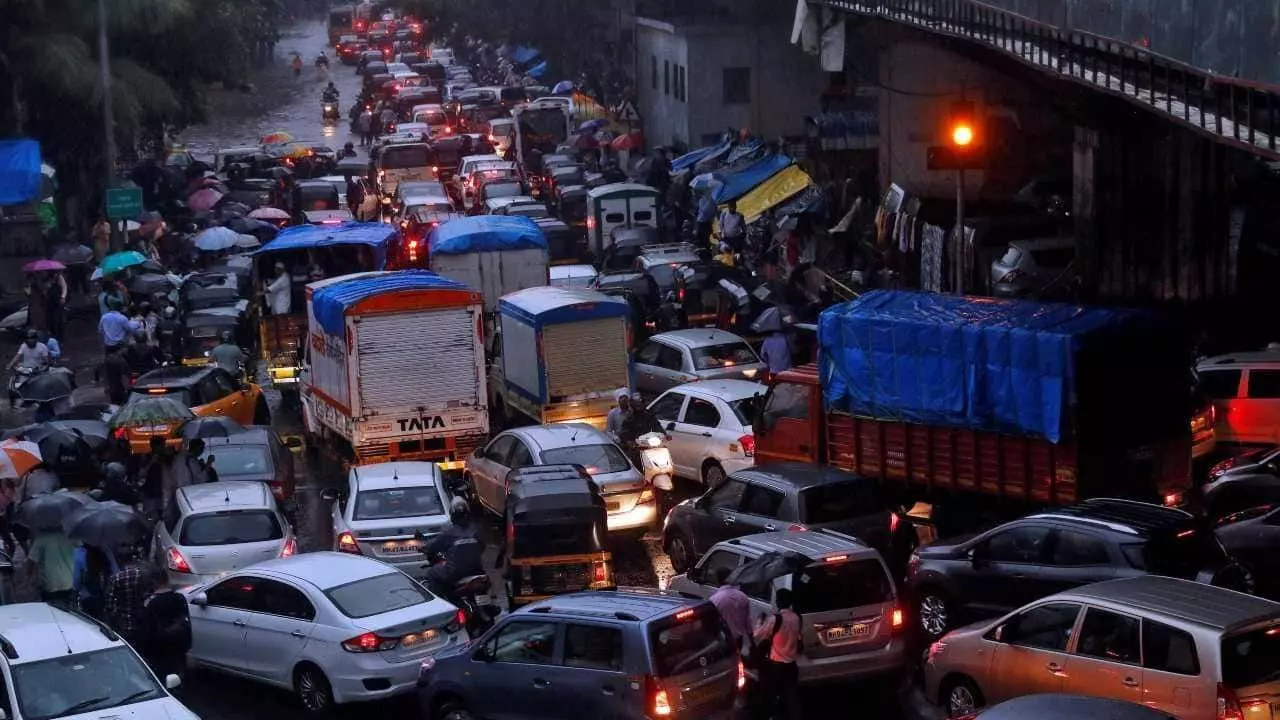Urban Mobility Happiness Study: Longer travel times, costly gas prices bothering commuters
The poll was carried out in eight Indian cities including Hyderabad
By Newsmeter Network
Telangana police has issued alert on fake messages circulating online of discounts on traffic e-challans
Hyderabad: A high number of commuters (two and four wheelers) in Hyderabad state that-- travel time to work has increased multi folds owing to rising traffic. In addition, commuters expressed their opinion that a compact smart car can reduce the travel time in the city.
A study conducted by MG Motor revealed useful insights into the mobility patterns of people living in key Indian cities and the issues they experience while commuting. The poll was carried out in eight Indian cities - Ahmedabad, Bangalore, Pune, Mumbai, Delhi NCR, Chennai, Hyderabad, and Kolkata - the majority of which are well-known for the myriad issues that their citizens confront on a daily basis. Men and women aged 18 to 37 years old, who owned at least one car, participated in the poll. However the publishers did not reveal the sample size and the duration.
The following are the survey’s key findings.
General Results
Inadequate parking infrastructure, a prevalent problem
Parking is a typical problem for car owners. Only 26% of poll respondents said it was easy to find parking, while 74% said it was difficult to find and manage parking places in their towns. Around 64% indicated that they either decided not to use cars owing to a lack of parking or had to change their plans due to parking availability.
71% of car owners travel with only one passenger
The majority of car owners do not use shared transportation. Around 71% of those polled said they drove alone or with only one additional passenger. Just 1% of those polled said they always travel with more than one passenger.
73% prefer personal transportation
Vehicles are commonly utilised for intra-city commuting, with 73% of respondents indicating daily or occasional use for work or college trips. Furthermore, car owners in cities commonly utilise their vehicles for home tasks, shopping, social activities, and weekend getaways. Around 38% of survey respondents said they also used cars in emergency situations.
Gasoline is the favourite fuel, but trends are changing
Despite growing environmental worries about fossil fuels, a sizable proportion of people still choose gasoline-powered vehicles. According to the report, 50% own gasoline vehicles, while 35% own diesel vehicles. Despite this, there is a growing trend among car owners to switch to the alternative powertrain technology.
81% reported using the luggage space for a laptop bag
According to the poll results, around 77% of respondents use their car’s luggage capacity on a daily basis. Among these, 81% reported using the luggage space to transport a laptop bag.
Yearly increase in travel distances and time
Around 71% of survey respondents reported spending more than 30 minutes to an hour on their daily commute to work or college. As many as 61% of respondents reported longer travel times compared to their average journey time five years earlier.
Increasing gasoline prices are impacting commuters
Fuel price increases have had a widespread impact, with urban automobile drivers being no exception. Approximately 52% of participants said the fuel price increases had a significant impact on them. In addition, nearly half of the respondents reported spending more than Rs 6,000 per month on petrol.
Concerns about urban air and noise pollution
Most city people are concerned about air and noise pollution, as evidenced by the UMHI findings. More than 80% of respondents believe their city’s air is contaminated. Similarly, by nodding in agreement, an identical number of survey participants confirmed the presence of noise pollution in their metropolitan region. Furthermore, 69% of respondents indicated that the environment was an essential consideration when choosing a car.
Small smart automobiles to overcome urban mobility issues
Smart mobility technologies have long been promoted as potential solutions to India’s urban mobility difficulties. According to the UMHI survey, nearly 90% of individuals believe that a compact smart car may minimise their commuting time in the city, alleviating many of the difficulties they confront on a daily basis.
Calculating the Happiness Quotient
Commuters in all major Indian cities experience anxiety as a result of long journeys, distance and on-road congestion, and widespread noise and air pollution.
According to the survey, more than 80% of respondents experienced anxiety during their daily commute in the city. The poll also developed a city-specific happiness score for mobility based on respondents’ ratings on various characteristics. While Kolkata, Pune, and Chennai performed well on the measure, ratings for Bangalore, Ahmedabad, Mumbai, Hyderabad, and Delhi NCR highlighted respondents’ dissatisfaction with their cities’ mobility.
Gaurav Gupta, Chief Commercial Officer at MG Motor India, commented on the report, saying, “The findings of the Urban Mobility Happiness Survey have provided us with significant insights into the driving behaviour of Indian consumers and their preferences for mobility solutions. The report clearly shows that automobile owners emphasise convenience, safety, and overall driving experience in addition to vehicle performance and features. We realise the necessity of keeping up with our clients’ increasing needs as a brand determined to supply cutting-edge mobility solutions.”